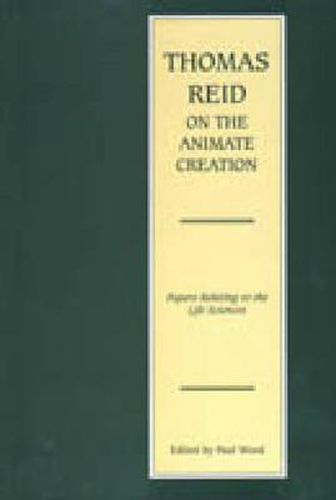Readings Newsletter
Become a Readings Member to make your shopping experience even easier.
Sign in or sign up for free!
You’re not far away from qualifying for FREE standard shipping within Australia
You’ve qualified for FREE standard shipping within Australia
The cart is loading…






Best known as a moralist and one of the founders of the Scottish Common Sense school of philosophy, Thomas Reid (1710-96) was also an influential scientific thinker. Here his work on the life sciences is studied in detail, bringing together unpublished transcripts of his most important papers on natural history, physiology, and materialist metaphysics.
Part I provides the first published account of Reid’s reflections on the highly controversial theories surrounding muscular motion and the reproduction of plants and animals and relates them to the broader Enlightenment debates on these issues. It also contains the first systematic reconstruction of Reid’s opposition to materialism and views his polemics against the noted Dissenter Joseph Priestley in terms of their differing interpretations of the Newtonian legacy, their conflicting philosophical assumptions, and the cultural politics of Common Sense philosophy in the 1770s.
Part II reproduces a selection of Reid’s most significant papers on the life sciences, including his Glasgow Literary Society discourses on muscular motion and on Priestley’s materialism, as well as other manuscripts that document the development of his scientific ideas.
$9.00 standard shipping within Australia
FREE standard shipping within Australia for orders over $100.00
Express & International shipping calculated at checkout
Stock availability can be subject to change without notice. We recommend calling the shop or contacting our online team to check availability of low stock items. Please see our Shopping Online page for more details.
Best known as a moralist and one of the founders of the Scottish Common Sense school of philosophy, Thomas Reid (1710-96) was also an influential scientific thinker. Here his work on the life sciences is studied in detail, bringing together unpublished transcripts of his most important papers on natural history, physiology, and materialist metaphysics.
Part I provides the first published account of Reid’s reflections on the highly controversial theories surrounding muscular motion and the reproduction of plants and animals and relates them to the broader Enlightenment debates on these issues. It also contains the first systematic reconstruction of Reid’s opposition to materialism and views his polemics against the noted Dissenter Joseph Priestley in terms of their differing interpretations of the Newtonian legacy, their conflicting philosophical assumptions, and the cultural politics of Common Sense philosophy in the 1770s.
Part II reproduces a selection of Reid’s most significant papers on the life sciences, including his Glasgow Literary Society discourses on muscular motion and on Priestley’s materialism, as well as other manuscripts that document the development of his scientific ideas.